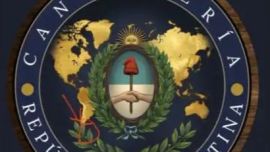Anyone familiar with Argentina knows that it is a land of political agitation and volatility. Protests are nothing new. But what is relatively rare is a full-blown police mutiny over pay and working conditions.
The country is grappling with the coronavirus pandemic. Now on top of that, add a strike by the Buenos Aires Province police force (the nation's largest, with about 90,000 active officers). The mutiny has massively defied the authority of Buenos Aires Province’s Kirchnerite Governor Axel Kicillof and his Security Minister Sergio Berni. Scores of officers staged a protest outside Berni's headquarters in La Matanza, a sprawling working-class district in Greater Buenos Aires, blaring the sirens of patrol cars and waving Argentine flags. The defiance went all the way up to President Alberto Fernández – on Wednesday a group of armed officers drove their patrol cars to the Olivos presidential residence to protest noisily outside its gates.
The BA province police has a terrible human rights record and can be unpredictable under pressure. The Olivos protest was stomach-churning to many. It brought back memories, on a smaller, more farcical scale, of the military rebellions against President Raúl Alfonsín in 1987. Former caretaker president Eduardo Duhalde (once a kingmaker in the Peronist party and forced into semi-retirement after losing his confrontation with the Kirchnerite wing) recently warned about a potential military coup and said that next year's midterm elections would not take place. He later took back his comments and put them down to a momentary lapse of reason, but armed protests by security forces outside the presidential residence are generally considered out of bounds in a democracy.
Eventually, the most prominent opposition leaders, including centre-right Buenos Aires City Mayor Horacio Rodríguez Larreta, condemned the show of force outside Olivos.
The provincial police is currently under investigation after the body of Facundo Astudillo Castro, a 22-year-old missing youth, was found near Bahía Blanca. Berni has tried to stamp his authority on the notoriously fierce force by preaching law and order (opposition politicians have a sarcastic nickname for Berni: Rambo). Ultimately, the protest outside Olivos was a strategic mistake by the mutineers.
They may not have been intentionally part of a putsch against Fernández, but the sight of the police practically toting their lethal weapons in the direction of the head of state's official residence looked menacing.
Two presidential officials went out to ask the protesters if they wanted to name representatives to meet with the president. The defiant officers, who do not have a union and lack a clear leadership, refused and said that television cameras should be allowed in.
The Fernández administration, even during the coronavirus lockdown, has been hit by a wave of angry anti-government street demonstrations – a protest was held on July 9 against the announced nationalisation of the debt-ridden grain exporter Vicentin; on August 17, another flag-waving demonstration was staged, in part sparked the the judicial reform bid; a new protest has been called for today (September 13). The street demonstrations during the quarantine have divided the opposition. Rodríguez Larreta, who has worked with the president in the fight against the pandemic, did not endorse the August 17 protest. On Wednesday evening the City mayor also condemned the police show of force outside Olivos.
The extraordinary scenes outside the residence irked the militant wing of the ruling Peronist coalition. One pro-government group called for a rally on that very night “in defence of the democratic system.” The president had to remind his grassroots supporters that social distancing was at risk. The pro-government march was called off at the last minute. Still, a small group of militant Peronist demonstrators went to Olivos to voice their support for the government. The rebel police officers – who were demanding a 54 percent pay increase – had pulled out in their vehicles just minutes before.
The obvious risk, as the police mutiny raged on Wednesday night, was a violent confrontation on the president's doorstep. The opposition has defied the lockdown and the hawkish wing of the centre-right coalition Juntos por el Cambio (JxC) has agitated in favour of the protests. The ruling coalition, which has considerable muscle, has refrained from calling street demonstrations because of the pandemic. Effectively, this means that only the opposition is out on the streets complaining.
How many things can happen in a single day? Many, it turns out. The president on Wednesday evening ended up addressing the nation with top officials in attendance, including Kicillof and a host of opposition centre-right mayors from districts in the province. (Greater Buenos Aires is a Kirchnerite bastion – Kicillof won the election late last year against centre-right governor María Eugenia Vidal by a massive landslide, but JxC still rules in some districts.)
The president rapidly announced his solution to the crisis: more cash will be pumped into the province with a one-percent reduction in federal revenue for Buenos Aires City, by decree. Ouch. Did that hurt Rodríguez Larreta? Former president Mauricio Macri, who lost the election to Fernández last year, transferred most of the Federal Police to Buenos Aires City in 2016 and by decree increased the amount of revenue-sharing it receives to pay for it (from 1.4 percent to 3.5 percent).
The president on Wednesday evening made of point of revealing that he had discussed the funding issue with Vice-President Cristina Fernández de Kirchner. The reduction in federal money Buenos Aires City receives had been discussed before the coronavirus hit Argentina in mid-March. Fernández and Rodríguez Larreta have since displayed bipartisan civility in dealing with the virus (to the point that the president has even called the mayor a “friend”) and the federal revenue reduction was put on ice. But Fernández de Kirchner has insisted that the contrast between the affluence of Buenos Aires City and its neighbouring province is too stark. She believes something should be done about it.
Rodríguez Larreta is reportedly mulling taking the case to the Supreme Court, arguing that federal revenue sharing can't be altered by a presidential decree. PRO (the mayor's party in the Juntos por el Cambio coalition) condemned the president's decision, calling it daylight robbery. The centre-right mayors who were present alongside their Peronist colleagues when Fernández delivered his speech said they were not told what the announcement was going to be about and that they were under the impression that they were invited to Olivos to show institutional support for the president, due to the ugly police protest outside. Fernández later reached out to Rodríguez Larreta and other opposition officials, claiming no malice on his part.
The presidential announcement was potent enough for the mutiny to let off some steam. A similar uprising over pay had spread to other provincial police forces in 2013, when Fernández de Kirchner was head of state.
Kicillof on Thursday morning unveiled a salary hike and increases in overtime pay and bonuses for uniforms (initially for 39,500 officers). The plan is to equalise the salary scale of the provincial police with that of the federal police, delivering on a “historic demand,” as the governor put it. Berni, who before this crisis had political ambitions that potentially included running for Congress next year, was in the audience when the announcement was made on Thursday, despite rumours about his resignation. Kicillof did not comment on the police officers' demand that they not be punished for their actions, though authorities later confirmed there will be no sanctions issued.
The protest movement calmed across the province on Thursday when news of an agreement spread. But Kicillof will face questions, including from within the ruling coalition, as to why he failed to anticipate the crisis. He will now be more exposed to attacks from the conservative opposition he so convincingly defeated less than a year ago.






















Comments